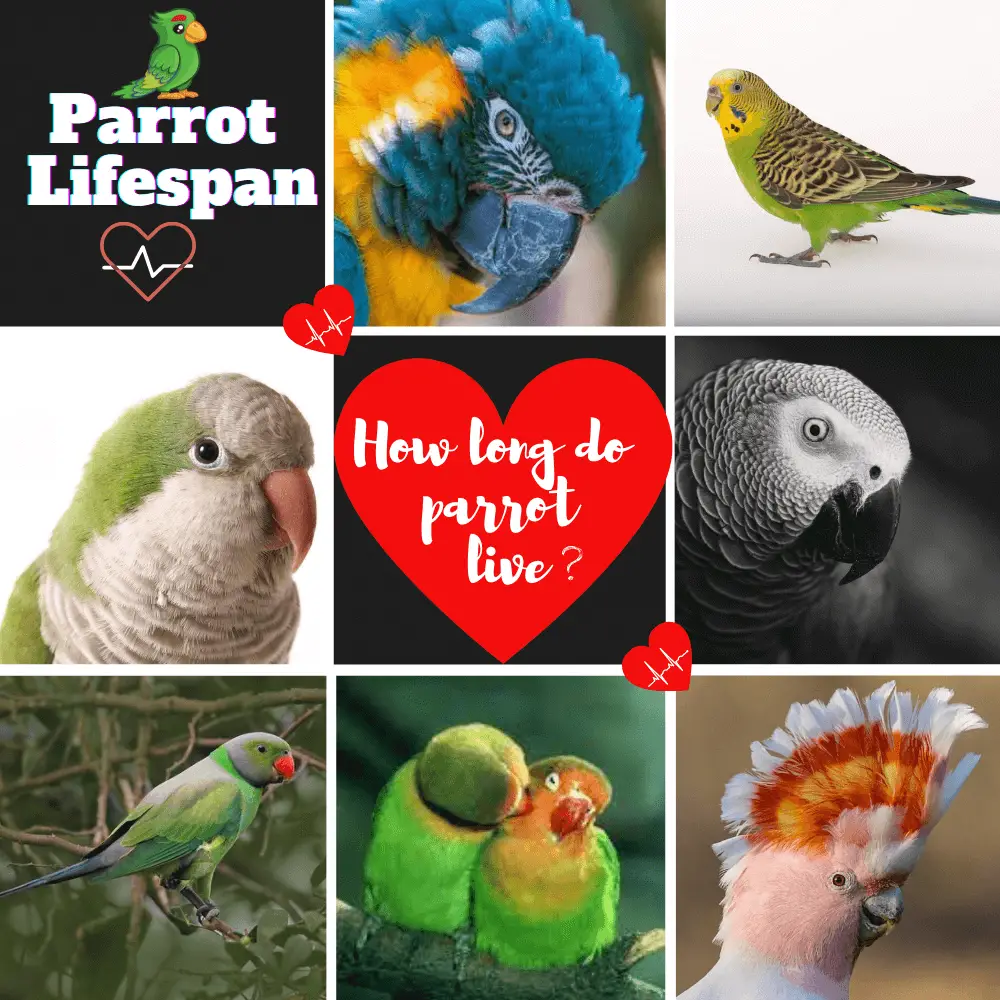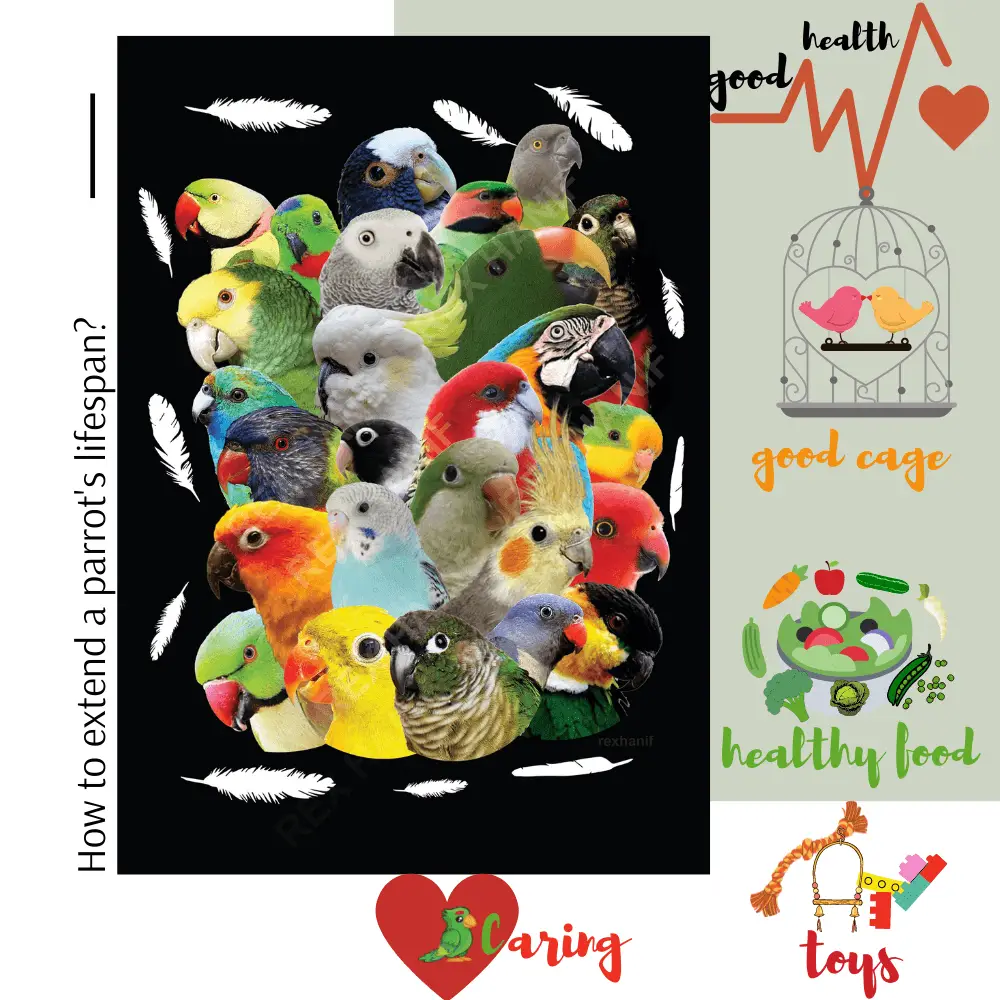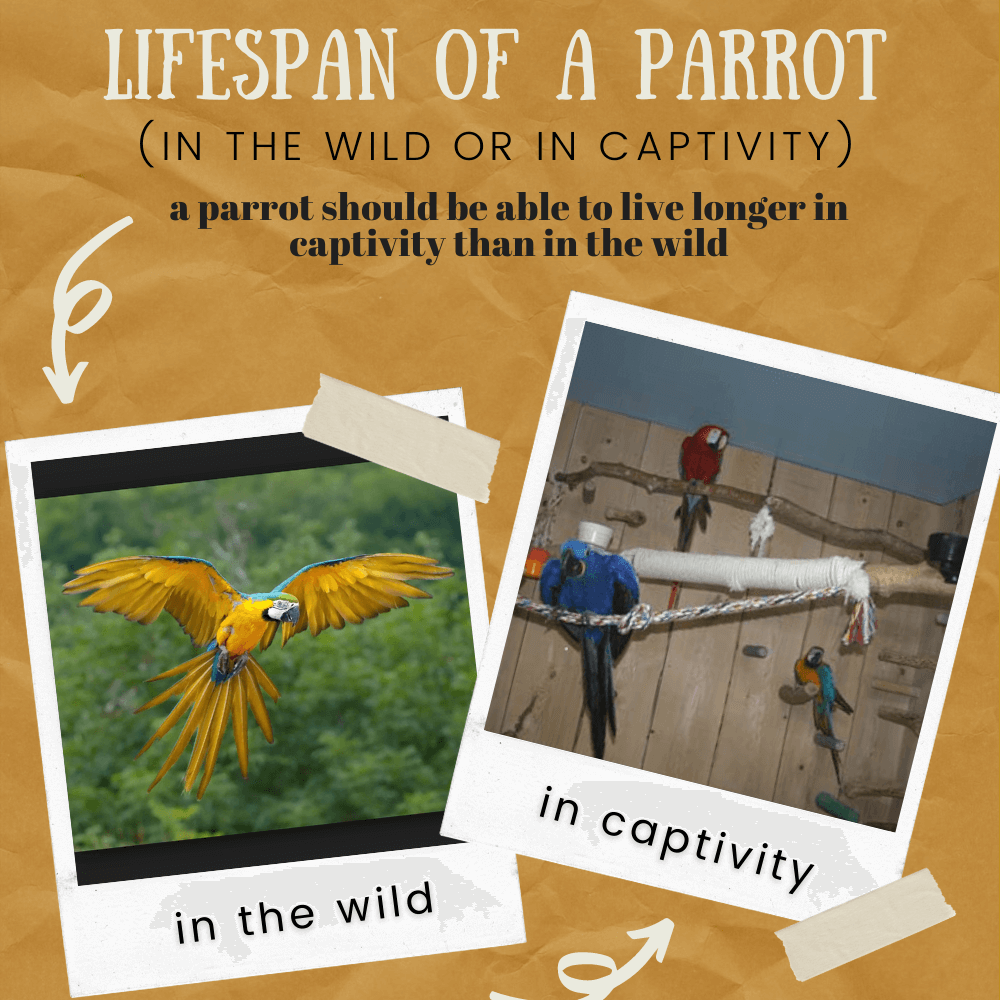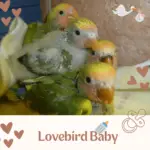
Parrot Lifespan: A parrot is divided into different species which have different statistics regarding life expectancy. It’s important to remember, however, that these pets are quite long-lived, meaning they can live up to a dozen years. The life cycle of some species is ten years, while for others it can be eight times longer!
Whatever species of parrot you are going to choose, we must remember that a bird is not a toy. It requires your full attention and care. If you don’t have the time or the will, watch out.
This is not an animal that you can leave alone all day or not let out of its cage at all. Such a situation would cause great harm to the parakeet, both mentally and physically, and it could even die (not after ten years, but after one year).
How long do parrot live
A number of parrot species are able to live with you for their entire lives, making them special pet birds. It is also common for them to outlive their owner.
Birds bred in captivity generally live longer than birds bred in the wild, mainly because they are less likely to encounter certain diseases or predators while living in your home. However, this does not mean that they are immune to disease or have a reduced lifespan.
As a general rule, the larger your parrot, the longer it enjoys a life expectancy.
Below is a summary table of the parrot lifespan according to its species :
The ages listed are based on a healthy bird raised under ideal conditions. However, the age of pet birds can vary and some will live longer (or shorter) than the ages listed.
| Parrot lifespan African grey | Usually between 40 and 60 years old, or more. |
| Amazon parrot lifespan | 25 to 75 years old |
| Parakeets (parakeets) | From 5 to 18 years old |
| Budgie lifespan | 5 to 10 years old |
| canaries lifespan | 10 years |
| Cockatiel lifespan | 10 to 15 years |
| Cockatoo lifespan | 20 to 60 years old |
| Conure lifespan | Depending on the species, 10 to 30 years can be expected. |
| Timneh African Gray | 40 to 60 years old |
| Eclectus parrot lifespan | 30 to 50 years or more |
| finches lifespan | Usually between 5 and 9 years old, but it can be longer with an aviary. |
| Parrot lifespan macaw | 30 to 50 years or more, depending on the species. |
| Quaker Parrot (Monk Parakeet) | 20 to 25 years old |
| Senegal parrot lifespan | Up to 50 years old (in the wild it’s only about 25 years old) |
| Pionus parrot lifespan | 25 years |
| Caique parrot lifespan | Up to 50 years old |
| Lorikeet lifespan | 10 to 30 years |
| Lovebird lifespan | 10 to 15 years |
You now know what the life expectancy of a parrot of its kind is.
What is the life span of a parrot
SOURCE: The Zoological World
How to extend a parrot’s lifespan?

Parrot longevity can be really long, but it doesn’t happen very often. It seems that most domesticated birds fail to reach the same age as world record holders, especially in domestic settings.
Nevertheless, we can certainly influence the longevity of our pets. Is there anything you can do to make your bird companion as happy as possible?
Be attentive to the health of your parrot
First of all, we must take care of our pet’s health. A parrot’s behavior can change suddenly and abruptly during illness or injury. Under no circumstances should these changes be ignored.
We must immediately contact the vet if anything worries us. The cage and environment should be maintained properly, with regular cleaning and changes of water and food. The bird should not experience drafts, excessive cooling or overheating.
The environment
The bird’s environment is almost as important as its diet. Improper nutrition can adversely affect the health of the animal, which significantly reduces its lifespan.
Random accidents are a common cause of death in birds. So you should keep your pet’s safety in mind. Before releasing your parrot from its cage, make sure it is not exposed to any danger when it flies or walks around the room. Smoke and fumes from cooking are dangerous to parrots. You should also remove all poisonous plants from the room.
Physical activity
In addition to this, our feathered animal must also receive physical activity every day, so we must buy him a spacious cage with toys so that he moves more. The parrot must still be free to walk around the apartment, at least once a day.
food
Most parrots need a grain mix that suits them. But we must not stop there. Parrots need fruits, vegetables, fresh greens, as well as eggs, and limestone blocks.
See our page dedicated to food for parrots, to find out how to feed them well.
Mental Health
It is common for parrots to suffer from stress when their environment is drastically changed. A bird that feels unhappy is more prone to developing illnesses. When the bird’s psyche suffers, behavioral problems also appear. Parrots are social animals, endowed with a high level of intelligence. We must offer them new challenges and devote enough time to them every day.
conclude
Longevity is not only a blessing, but also a serious challenge. For many years, our life will undoubtedly experience many changes, for which we must also prepare our pets.
For this reason, proper socialization of parrots is crucial. Pets need to be used to new people, places, and things from an early age. They also need to be taught to cope with the changes they encounter.
Why Do Parrots Live So Long?
Parrots tend to live much longer than other animals of similar size.
This isn’t just true for parrots, but in general, any animal that flies tends to live longer than an animal that doesn’t. This is partly because flying provides lots of exercises. Exercise is well known to increase the longevity of most parrots.
Parrots can fly, which makes them fly away from the danger of any predator. Additionally, many parrot species live in groups to provide an even higher level of security.
A longer lifespan means they can reach sexual maturity later in life. So breeding at a later stage allows parrots to avoid passing on genetic imperfections that will shorten their lifespan.
Volatiles also have lower levels of oxidative damage which prevents corruption of their DNA. Over a lifetime, this low level of damage allows them to live longer and reduce disease.
Lifespan of a Parrot (in the Wild or in Captivity)

In theory, a parrot should be able to live longer in captivity than in the wild. But in reality, things are a bit different.
Parrot Lifespan in the wild
Predators, disease, and injury decrease the lifespan of wild parrot species. But the advantage of a wild bird over a captive bird is that it is not limited to the unnatural environments of a house, cage, or aviary.
Parrot Lifespan in captivity
Unfortunately, many bird owners neglect or do not take proper care of their birds, which often results in a shortened parrot lifespan in captive birds. This can give many captive birds a lower life expectancy than their wild counterparts, although this is not necessarily the case. Make sure you’re not a bad pet bird owner by following some of our tips and checking in regularly.
The oldest parrot that ever lived
As you can see, parrots are long-lived birds. There are cases where they have far exceeded their average lifespan. According to the Guinness Book of World Records, the world record for the oldest parrot to be recorded is that of Cookie, a Leadbeater’s Cockatoo who died at the age of 83
Another pretender to the throne is Duster, an umbrella crested cockatoo who is currently registered at the age of 89 and whose original age dates back to when he was featured in a local news segment.
SOURCE: Brookfield Zoo
Other long-lived parrots
Another famous parrot is the Tarbu, a private African Gray who lived to be 55 years old.
There is also the New Zealand Kakapo parrot, which is a super rare species and only has 150 individuals left in existence. The average lifespan of these birds is 60 years but some individuals have been recorded as living up to 90 years.



















